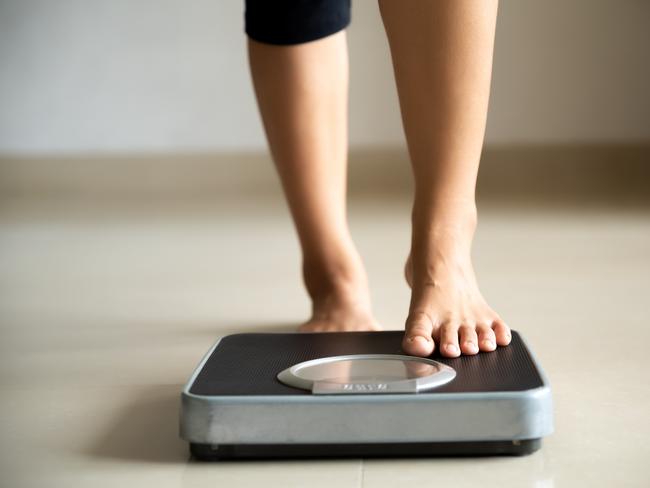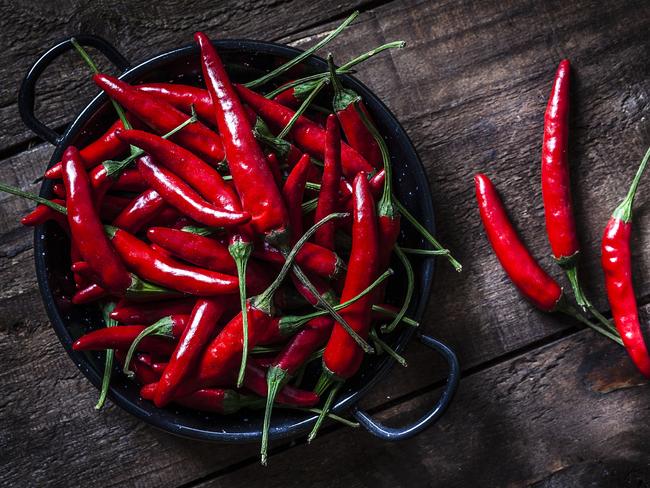This single change to your food can help you eat less overall
Scientists say this one easy adjustment to your food can make you eat less – and help you lose weight.

Lifestyle
Don't miss out on the headlines from Lifestyle. Followed categories will be added to My News.
Red hot skinny peppers?
Scientists at Penn State University’s Sensory Evaluation Center have discovered that a little heat goes a long way in limiting caloric intake at meal times.
Their findings, slated to be published in the October issue of Food Quality and Preference, suggest that the “oral burn” left by spicy foods has a direct bearing on consumption habits, and adding slightly more spice to a meal can lead to eating less.
“We know from previous studies that when people slow down, they eat significantly less,” said Paige Cunningham, a postdoctoral researcher and lead author on the study who earned her doctorate in nutritional sciences from Penn State in 2023.
“We suspected that making a meal spicier might slow people down.”

“We thought, let’s test, under controlled experimental conditions in the lab, if adding a small amount of spice, but not so much that the meal is inedible, will make people eat slower and therefore eat less.”
The research team conducted three experiments in which participants were served one of two meals: beef chilli or chicken tikka masala in two versions, mild or spicy.
Researchers found that increasing spice levels using dried chilli pepper effectively slowed the eating rate and reduced the amount consumed without affecting overall palatability.
“This points to added chillies as a potential strategy for reducing the risk of energy overconsumption,” said John Hayes, Penn State professor of food science and corresponding author on the paper.
“While portion control wasn’t the explicit goal of this study, our results suggest this might work.”
Hayes noted that an intuitive explanation for the caloric discrepancy would be that spicy eaters drank more water, leading them to “fill up” faster. However, water intake proved consistent, whether participants ate mild or spicy meals.


“This is why we need to do empirical studies of behaviour, because what you might intuitively expect is often not the case,” he said.
The study suggests that reduced caloric intake is motivated by oral processing; in essence, participants consumed spicier meals at a slower rate.
Cunningham noted that a slower eating rate equates to food remaining in the mouth for a longer period of time, which can signal satiety and lead people to eat less.
Further, the team found that appetite ratings taken before and after the meals were congruent, indicating that despite eating less of it, participants felt full after tucking into a spicy meal.
“Next time you’re looking to eat a little less, try adding a blast of chillies, as it may slow you down and help you eat less,” suggested Hayes.
In addition to curbing cravings, eating spicy food is associated with a pepper patch of health benefits.

Studies suggest that capsaicin, the compound found in jalapeños, habaneras, cayenne, and most other chilli peppers, may lower LDL, or bad, cholesterol, which accumulates on artery walls and constricts blood flow to the heart.
Spicy food can also help dilate blood vessels, promote circulation, and help manage blood sugar.
A 2006 study in the journal Cancer suggested capsaicin may inhibit the spread of prostate cancer cells. Spicy foods also boost immunity as studies suggest they can act as a decongestant, protecting against irritants and pollutants, like dust and smoke.
Better yet and better for your health, a Harvard University study suggested that people who ate spicy food every day saw a 14 per cent lower risk of death compared to people who ate spicy food only once a week or less.
Takeaway? Spice up your life to save it!
This article originally appeared on the New York Post and was reproduced with permission
Originally published as This single change to your food can help you eat less overall




